One of the best known non-Malawian, but still African, cultural experiences in Blantyre, is some authentic Ethiopian hospitality.
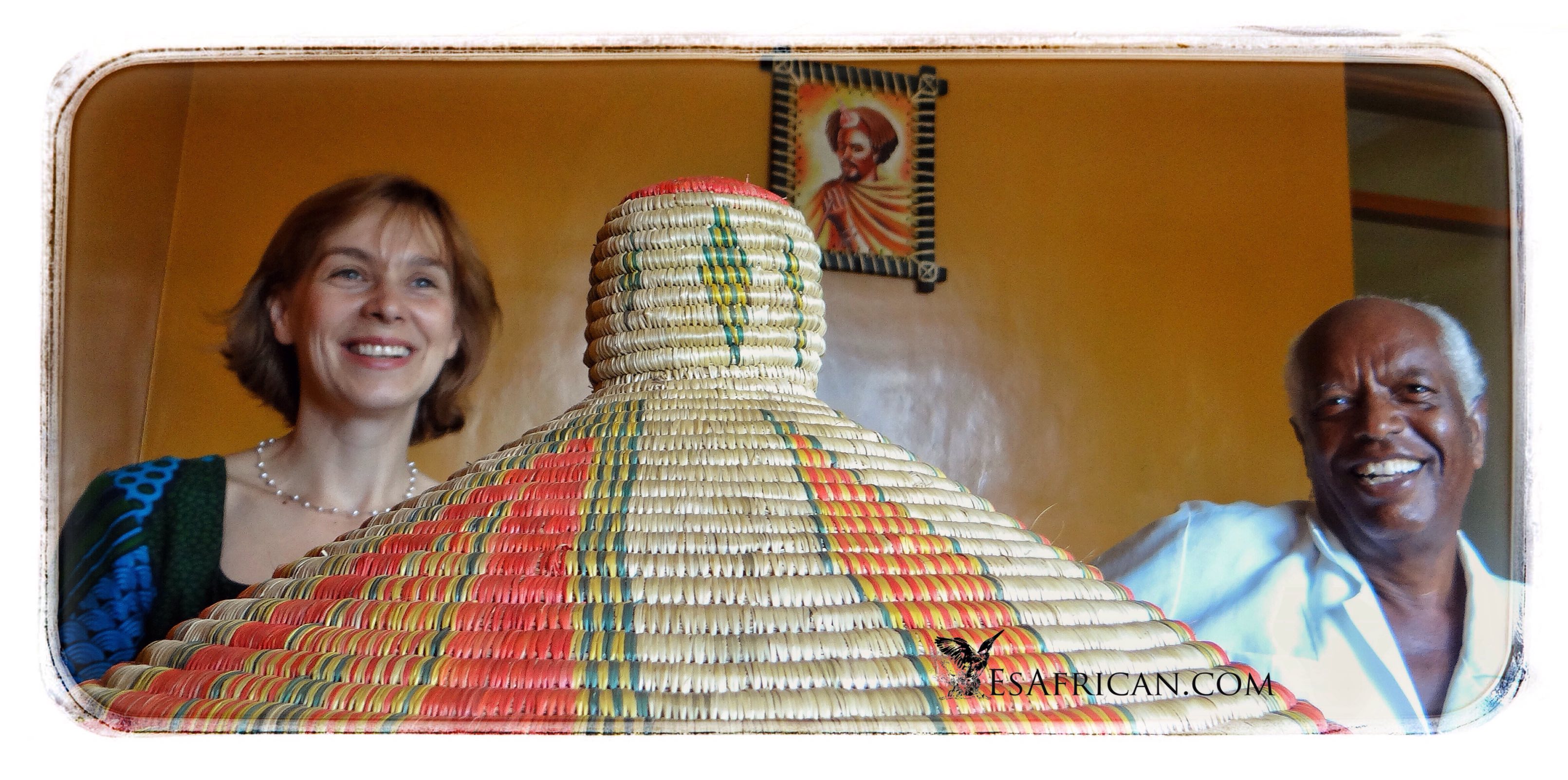 You are assured of a warm welcome at Alem Ethiopian
You are assured of a warm welcome at Alem Ethiopian
Alem Ethiopian used to be located on Victoria Avenue in the centre of town. There they had a restaurant. However, Alem have not gone far and although they no longer operate a restaurant, with some advance planning, you can still experience and enjoy an Ethiopian cultural experience. It was with this thought in mind, and some advance planning (the reasons for which will soon be revealed), that we headed out to learn some more. Why should we experience authentic Ethiopian culture in Malawi?
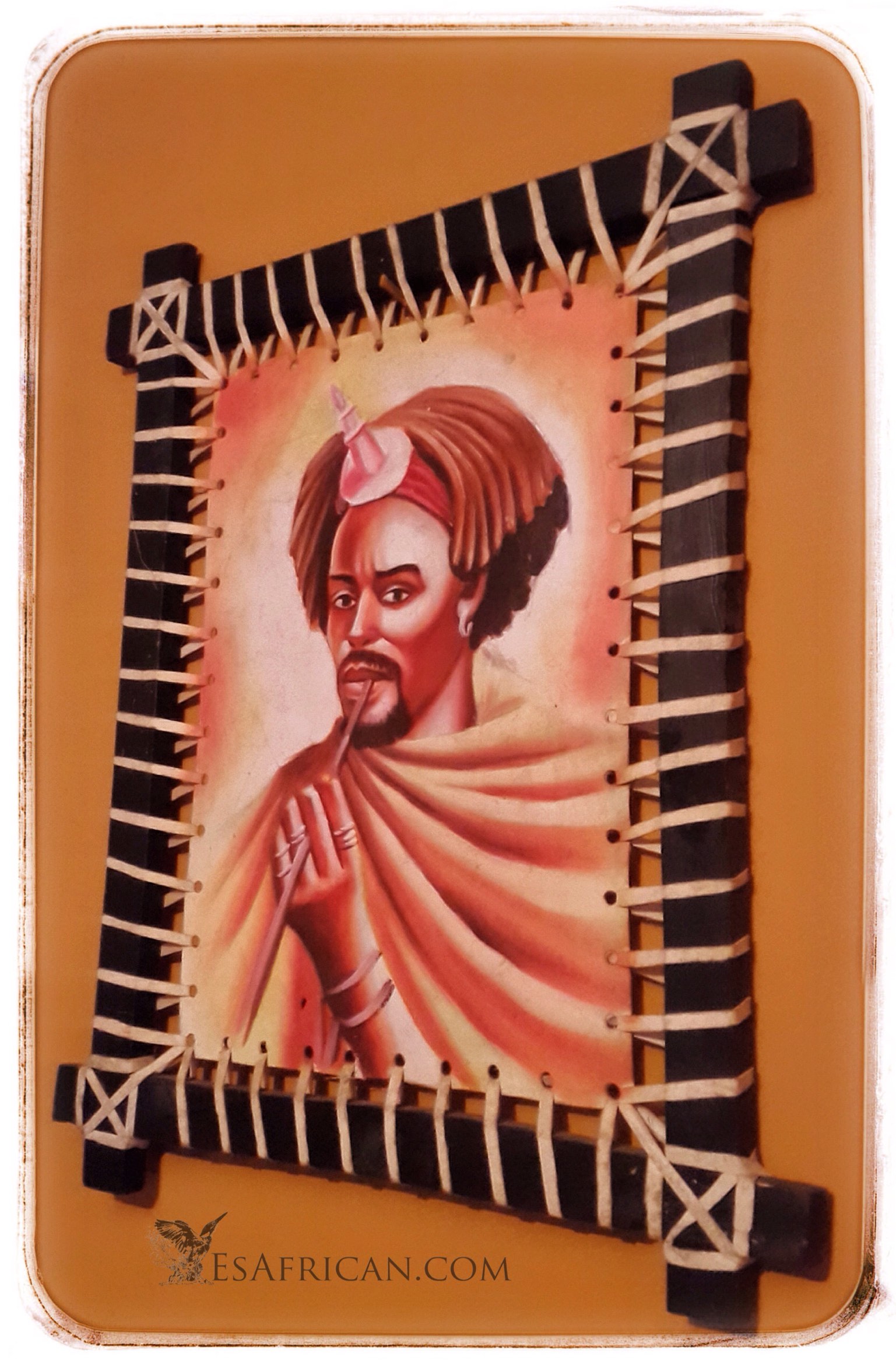 Ponder the secrets of EthiopiaREASON 1
Ponder the secrets of EthiopiaREASON 1
WONDER AT THE INTRUIGE OF ETHIOPA
Ethiopia has intruiged me ever since I first changed planes in Addis Ababa on the way to Malawi. When even a modern airport offers a glimpse of an ancient civilization one comprehends that there must be something fascinating to uncover. It is not just the long history of Ethiopia but it’s separation and isolation from other civilisations that that causes one to stop and wonder. Other civilisations, ancient and modern, have influenced each other a great deal, of course. Through the millennia Ethiopia stood distinct. External interactions were not as common. How is it that they trace their heritage back to the Old Testament? This is true even to the extent that the Jews of Ethiopia trace their own heritage to pre second Temple ancient Israel. Until recently the Ethiopian Jews seemingly knew nothing about the latter times within the Old Testament. Does not that itself strongly indicate Ethiopia’s distinctiveness? It is also the case that the Orthodox Ethiopian Church have a separate history to the rest of Christendom.
They say that the world is a village, a global village. Could Ethiopia really be…… another village?
I could go on about the geographical features that perhaps partly explain Ethiopia’s other-worldliness. Perhaps the mountains and surrounding deserts and distances have kept Ethiopia far from the madding crowds of the rest of world history. Tempted as I am, perhaps that is for another time and we should return to the significance of this to our place and time, further south in Africa, here in Blantyre and Malawi.
Reason one for visiting our Ethiopian family is to learn something from them, in discussion, about the mysteries and wonders of Ethiopia.
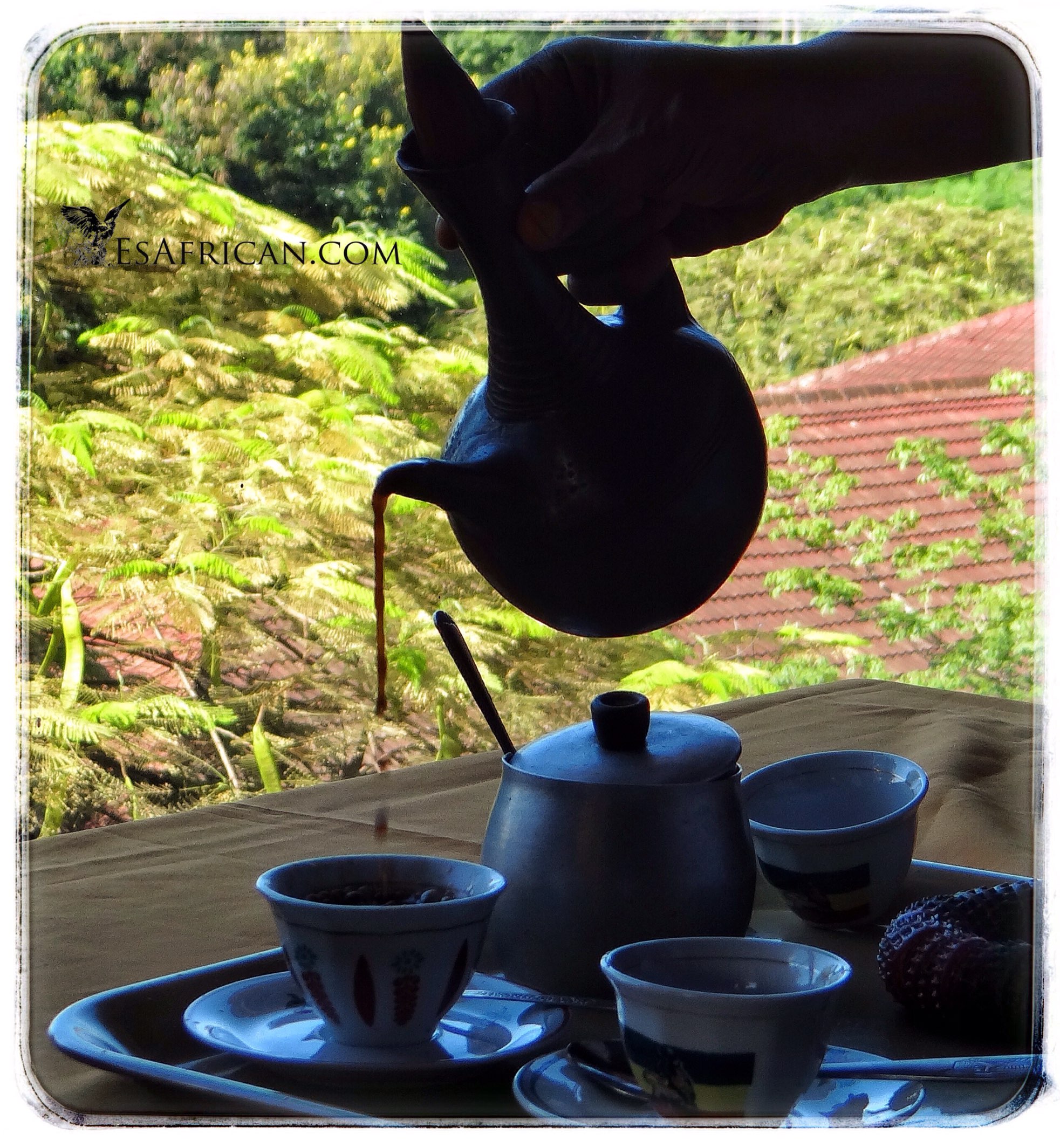 A whole ceremony surrounds the preparation and pouring of coffeeREASON 2
A whole ceremony surrounds the preparation and pouring of coffeeREASON 2
FIND AND TASTE THE ORIGINS OF COFFEE
Ancient cultures carry with them inherited wisdom from ages past. Distant lands have their own plants and herbs. The inherited wisdom extends to culinary traditions. Besides food, there are also drinks.
Coffee was discovered in Ethiopia….
If on the way to or from Malawi you change planes in Addis Ababa and you decide to buy a coffee…you will notice – there is something different. What is that difference and why?
I enjoyed reading an article about how coffee was discovered in Ethiopia in far ages past. The effects of coffee were discovered by a goat herder, or perhaps more accurately, by his goats. Wondering why his goats were so keep on a certain bush and thinking about the effect, by trial and error, ancient Ethiopians uncovered the wonders of coffee. Furthermore, Ethiopia has more different kinds of coffee than anywhere else in the world. Some of the best known coffees originate in Ethiopia.
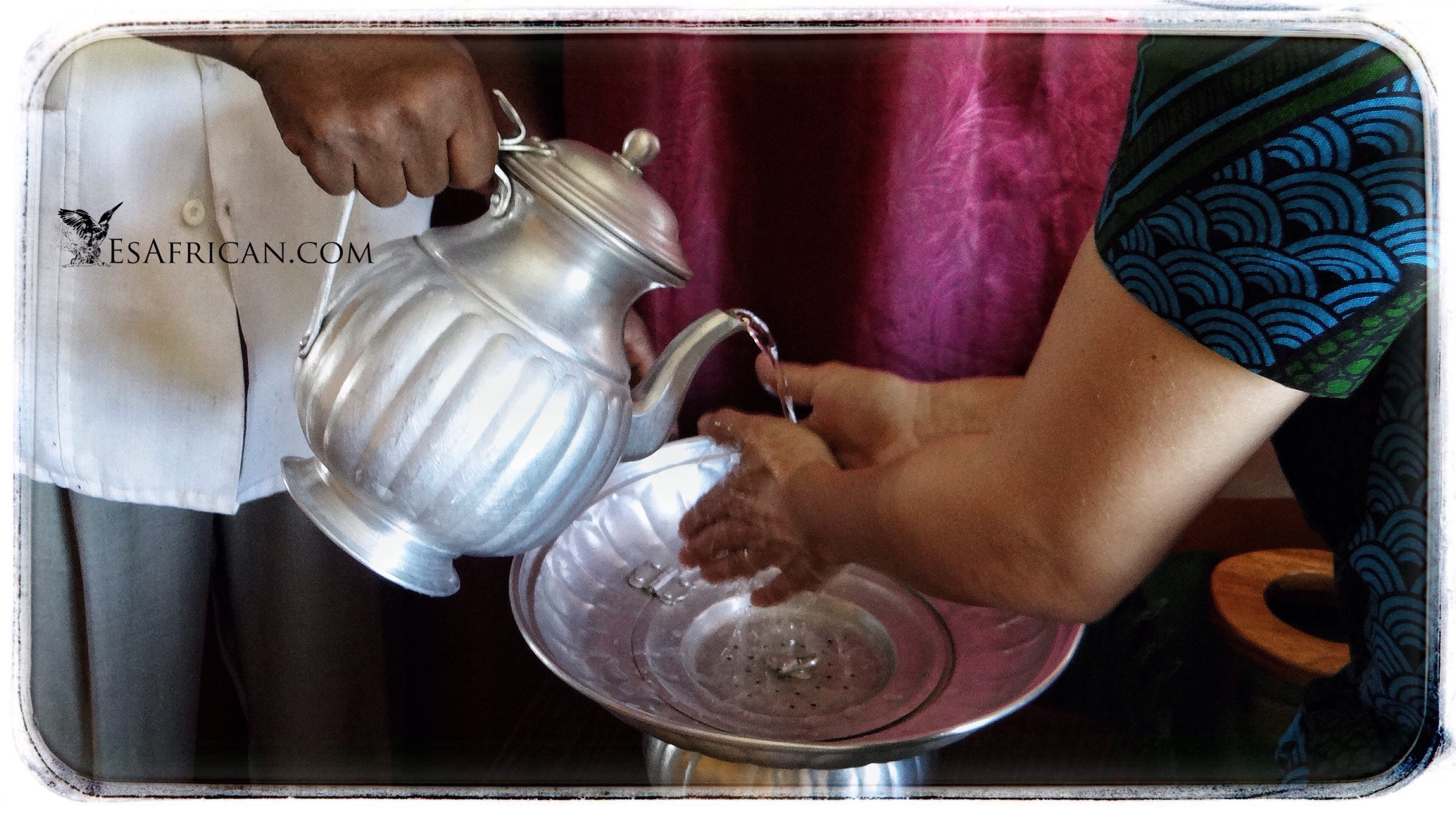 It is time to think of eating...What is it about eating and drinking that provides such a gateway into the feel of the place from where it comes? I don’t know. But there is something about the distinctiveness of the way it is prepared and poured and shared and all the differences and surrounding art work that make one feel ‘yes, this is Ethiopia!’
It is time to think of eating...What is it about eating and drinking that provides such a gateway into the feel of the place from where it comes? I don’t know. But there is something about the distinctiveness of the way it is prepared and poured and shared and all the differences and surrounding art work that make one feel ‘yes, this is Ethiopia!’
With Alem you will get true Ethiopian coffee, served and drunk with friends, old or new, in the Ethiopian way. I would argue, that while there, one should ask and talk and learn over a coffee. Learn about coffee yes, but not only coffee.
REASON 3
APPRECIATE ETHIOPIAN CUISINE
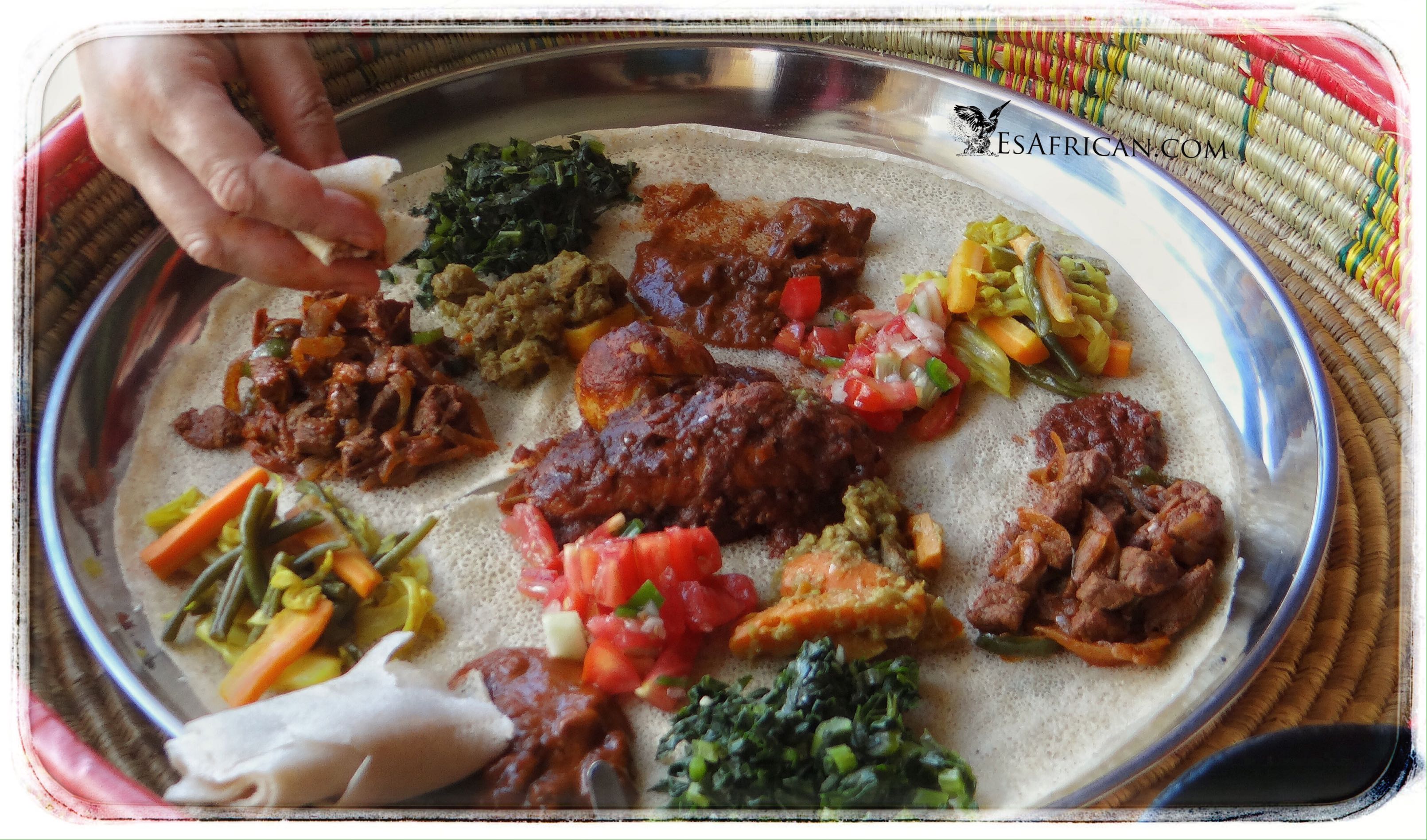 Delicious Ethiopian food is place on the injera within the moseb basketAs former restaurant owners your family from Ethiopia know one or two things about Ethiopian food. Indeed you can arrange in advance and they can treat you as honoured guests and friends in their home.
Delicious Ethiopian food is place on the injera within the moseb basketAs former restaurant owners your family from Ethiopia know one or two things about Ethiopian food. Indeed you can arrange in advance and they can treat you as honoured guests and friends in their home.
Certain points about Ethiopian food stood out in my memory when discussing these things with the Abebe family. Firstly, all of the spices that they cook with are from Ethiopia, they are not found in Malawi. Secondly, the preparation of the food is hard work and takes a lot of time. For those of us looking for a deeper experience than the fast food race, this sounded like an invitation to take time to appreciate something of value. Traditionally Ethiopian food is cooked in clay pots, with your host family at Alem, it is served with Ethiopian clay pots.
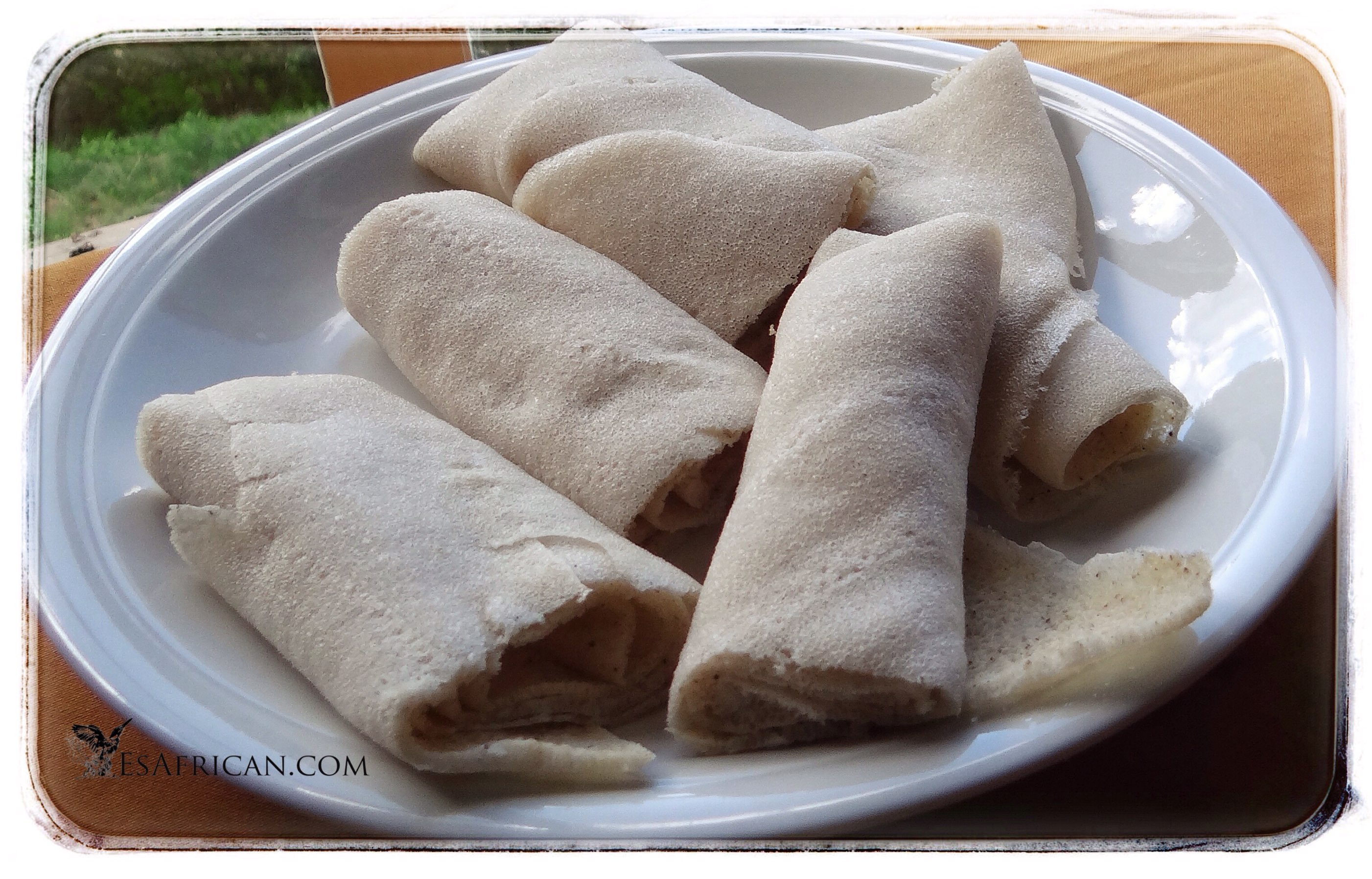 The process to make Ethiopian Injera Bread takes three days and involvs fermentation. It is worth the wait.Ethiopian bread, known as injera, is a very important part of Ethiopian life. This point was first very much impressed upon me when I ate at the airport in Addis Ababa. Like other Ethiopian food injera takes time to prepare. Indeed, the process, including fermentation, takes three days. Generally speaking, more fermentation means tastier bread. The bread is then a key part of eating the other food as you take the bread in your hand, break it, and use it to lift and eat the other food on your plate. Without doubt we found the food to be delicious and plentiful.
The process to make Ethiopian Injera Bread takes three days and involvs fermentation. It is worth the wait.Ethiopian bread, known as injera, is a very important part of Ethiopian life. This point was first very much impressed upon me when I ate at the airport in Addis Ababa. Like other Ethiopian food injera takes time to prepare. Indeed, the process, including fermentation, takes three days. Generally speaking, more fermentation means tastier bread. The bread is then a key part of eating the other food as you take the bread in your hand, break it, and use it to lift and eat the other food on your plate. Without doubt we found the food to be delicious and plentiful.
REASON 4
DISCOVER FOOD AND FRIENDSHIP - THE ETHIOPIAN WAY
In Ethiopia there is a saying if someone mistreats another, “How can you do this? You have eaten together!”
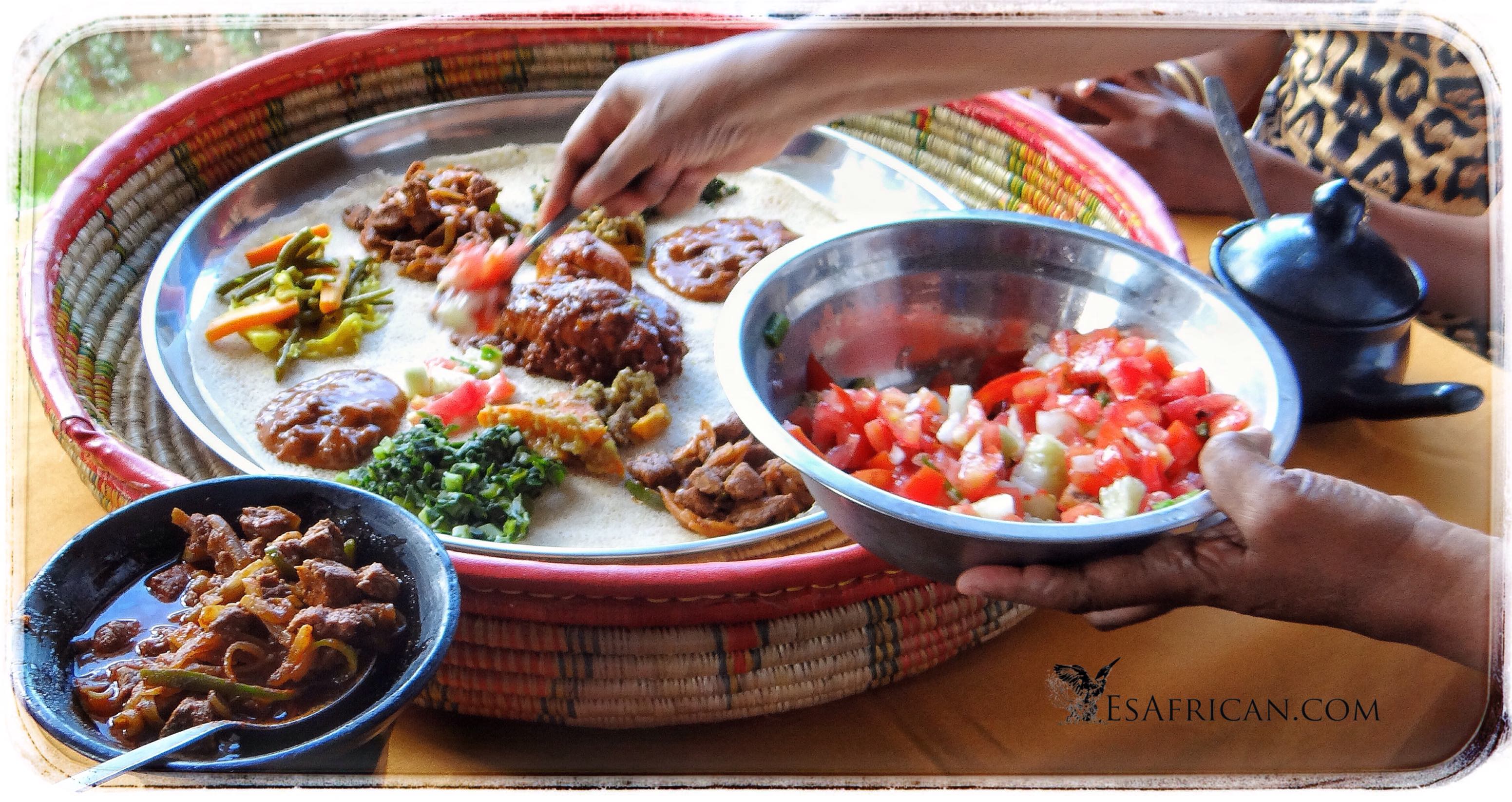 Some of the hot food waits in clay pots while the gaps are filled with various delicious options to tryEating in Ethiopia is a shared experience, the traditions of which indicate much about social bonding and the interaction of friends, neighbours and visitors. As you will see from the photos, Ethiopian food is eaten from a shared basket. As well as having a separate plate with injera (the very distinctive Ethiopian bread), the basket holding the main food has a large plate covered with injera. It is as if the ‘plate’ on the silver platter, within the basket, is also the injera bread. So, according to my western mindset, I eat the plate with the food! This is great – is not variety the spice of life?
Some of the hot food waits in clay pots while the gaps are filled with various delicious options to tryEating in Ethiopia is a shared experience, the traditions of which indicate much about social bonding and the interaction of friends, neighbours and visitors. As you will see from the photos, Ethiopian food is eaten from a shared basket. As well as having a separate plate with injera (the very distinctive Ethiopian bread), the basket holding the main food has a large plate covered with injera. It is as if the ‘plate’ on the silver platter, within the basket, is also the injera bread. So, according to my western mindset, I eat the plate with the food! This is great – is not variety the spice of life?
To start with when visitors arrive or neighbours meet you don’t say “I don’t have.” Instead, socially speaking, it is very important to say “There is.” This applies even if there is very little to be offered. This reminds of some humour from Scotland. In Glasgow, if someone hears that you will be visiting in Edinburgh, the Glaswegian may warn you that your friend in Edinburgh will likely greet you at the door with a definitive “Well, you’ll have had your tea.” If I can translate, that means that your friend from Glasgow is telling you that your friend from Edinburgh will announce their assumption, which must not be questioned, that you have already eaten. Therefore the host does not need to offer you anything. I am sure that that is unfair on Edinburgh folk but as someone who has lived in both cities, I can say that it is interesting to take note of different ways in different places.
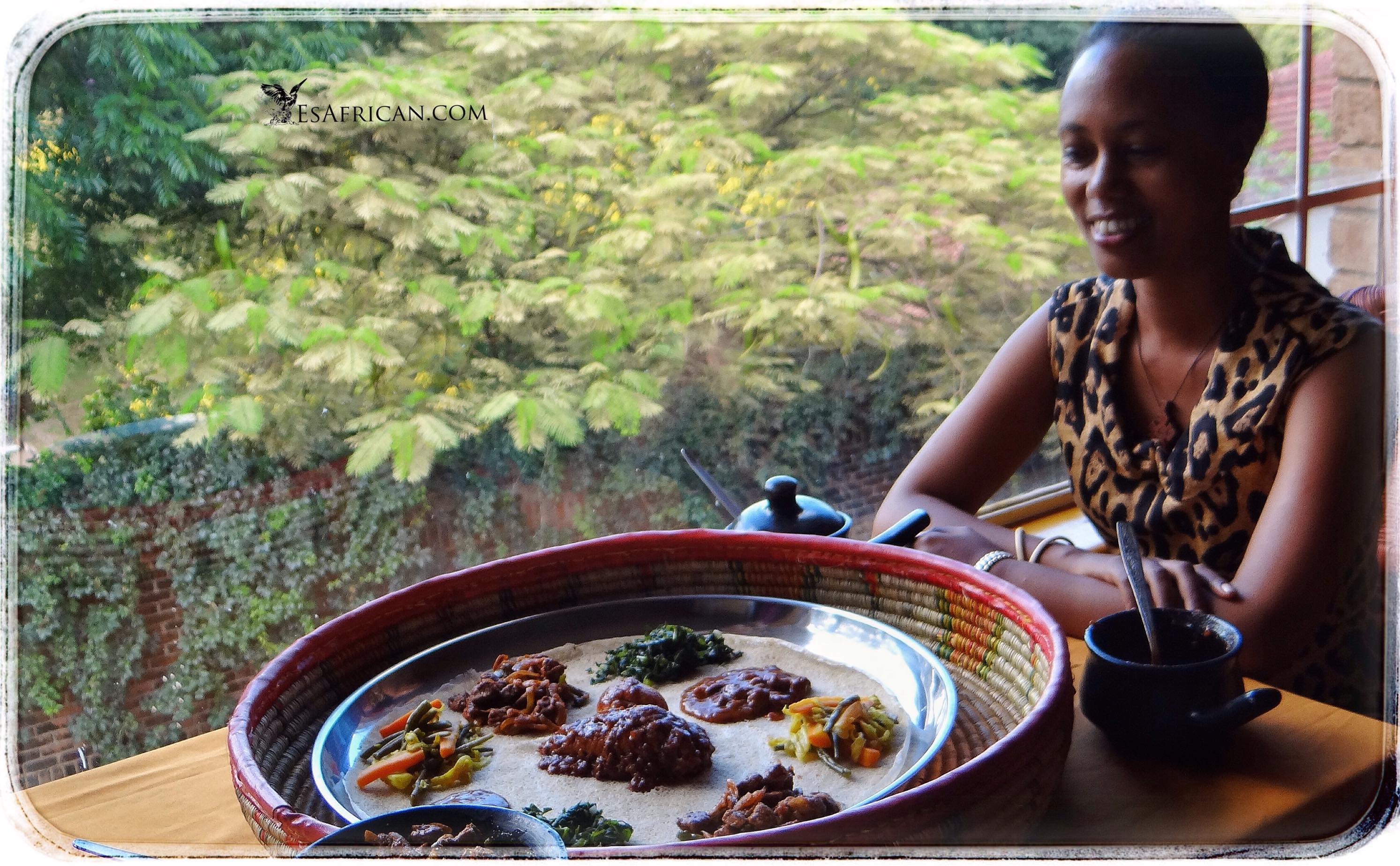 According to Ethiopian traditions the door is always open for you to join with others in eatingEthiopian hospitality does not conform to a stereotypical Glasgow view of Edinburgh hospitality…(most people in Glasgow will tell you wonderful things about Edinburgh, I am sure). What we learned from our Ethiopian hosts is that not only is there always ‘is’ and never ‘not’, but that there are still more social traditions to observe. The next one is that when you eat, you always eat with the door open. Eating with the door closed is a social ‘no no’. Eating with the door closed would be the opposite of an indication of a welcome. If you pass the door, you must come in! If you visit, you must eat!
According to Ethiopian traditions the door is always open for you to join with others in eatingEthiopian hospitality does not conform to a stereotypical Glasgow view of Edinburgh hospitality…(most people in Glasgow will tell you wonderful things about Edinburgh, I am sure). What we learned from our Ethiopian hosts is that not only is there always ‘is’ and never ‘not’, but that there are still more social traditions to observe. The next one is that when you eat, you always eat with the door open. Eating with the door closed is a social ‘no no’. Eating with the door closed would be the opposite of an indication of a welcome. If you pass the door, you must come in! If you visit, you must eat!
This is a cultural requirement to bear in mind if you, dear reader, ever visit the Abebe family of Alem Ethiopian… I recommend that you do plan a visit.
The next point on the Ethiopian eating traditions is one that must be left as optional for visitors from other places. Let me mention our opposite traditions in Scotland first. In our traditional Scottish castles, on a cold and bleak winter morning, as our wooden bowls of porridge are plonked on the table in front of us, in a cold and drafty hall overlooking a mist covered loch, the tradition is as follows. Elbows go down on the table either side of the porridge bowl. Spoons are held up in a threatening manner to ward off any danger from siblings who may want ‘more’. I believe that they have a similar tradition in London workhouses with their gruel (see Charles Dickens).
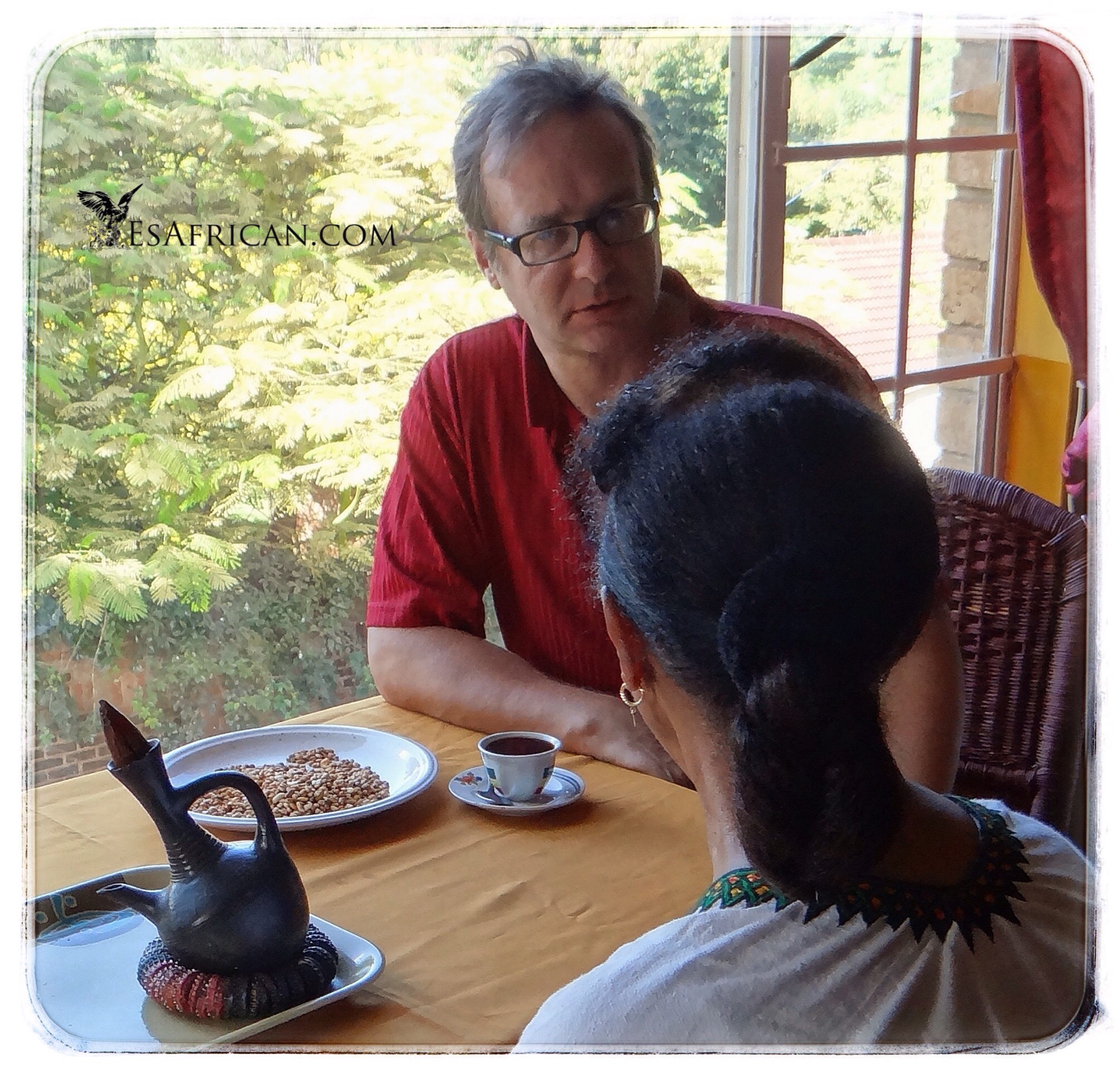 Get into some depth in your discussions to ensure that you learn and exchange as much as possibleIn Ethiopia it is the opposite. Here let me stress that I was not in any way pressured to try out this precise tradition. In Ethiopia it is normal not only to share from the same basket, but to actually feed your friend. As an indication of the intimacy of friendship surrounding eating traditions, you actually place the food in the mouth of your friend. I asked if this is only ‘husbands and wives’ who do this but was told no, it happens between friends. Some visitors I am sure would love to try this tradition as an excuse to further their friendship with their friends, others, might not. Still, regardless, it is another clear indication of the closeness between friends that is played out in the context of eating together.
Get into some depth in your discussions to ensure that you learn and exchange as much as possibleIn Ethiopia it is the opposite. Here let me stress that I was not in any way pressured to try out this precise tradition. In Ethiopia it is normal not only to share from the same basket, but to actually feed your friend. As an indication of the intimacy of friendship surrounding eating traditions, you actually place the food in the mouth of your friend. I asked if this is only ‘husbands and wives’ who do this but was told no, it happens between friends. Some visitors I am sure would love to try this tradition as an excuse to further their friendship with their friends, others, might not. Still, regardless, it is another clear indication of the closeness between friends that is played out in the context of eating together.
The final tradition that I noted is sometimes found elsewhere. At the end of the meal the different participants argue over who pays. Everyone insists on paying. “You are not paying, I am paying!” etc. Perhaps given the time taken to prepare Ethiopian food, not to mention the costs of ingredients and spices from Ethiopia, this is a tradition that visitors would be delighted to put into practice.
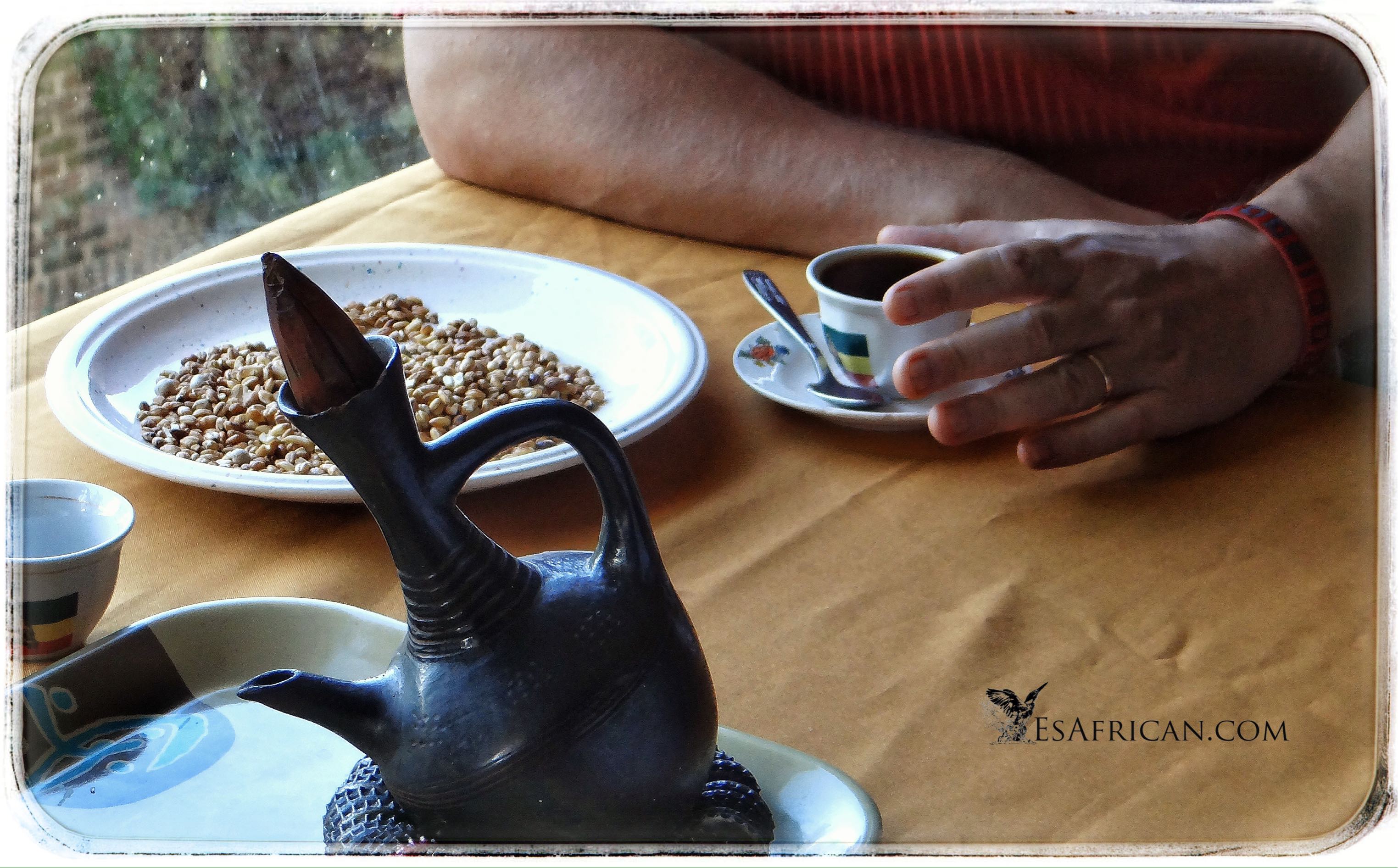 Enjoy a coffee and consider plans for a visit to EthiopiaREASON FIVE
Enjoy a coffee and consider plans for a visit to EthiopiaREASON FIVE
PREPARE FOR YOUR VISIT TO ETHIOPIA
Many people change planes in Addis Ababa on their way to and from Malawi. It would be a wasted opportunity to miss a fantastic visit to this ancient, mysterious, hospitable and beautiful land. I myself spent a full day in Ethiopia when flying between Malawi and Europe. It was an interesting day as I was befriended by an Ethiopian and I had a mixture of visiting museums and drinking coffee and going about with a group of Ethiopian friends in their daily life together.
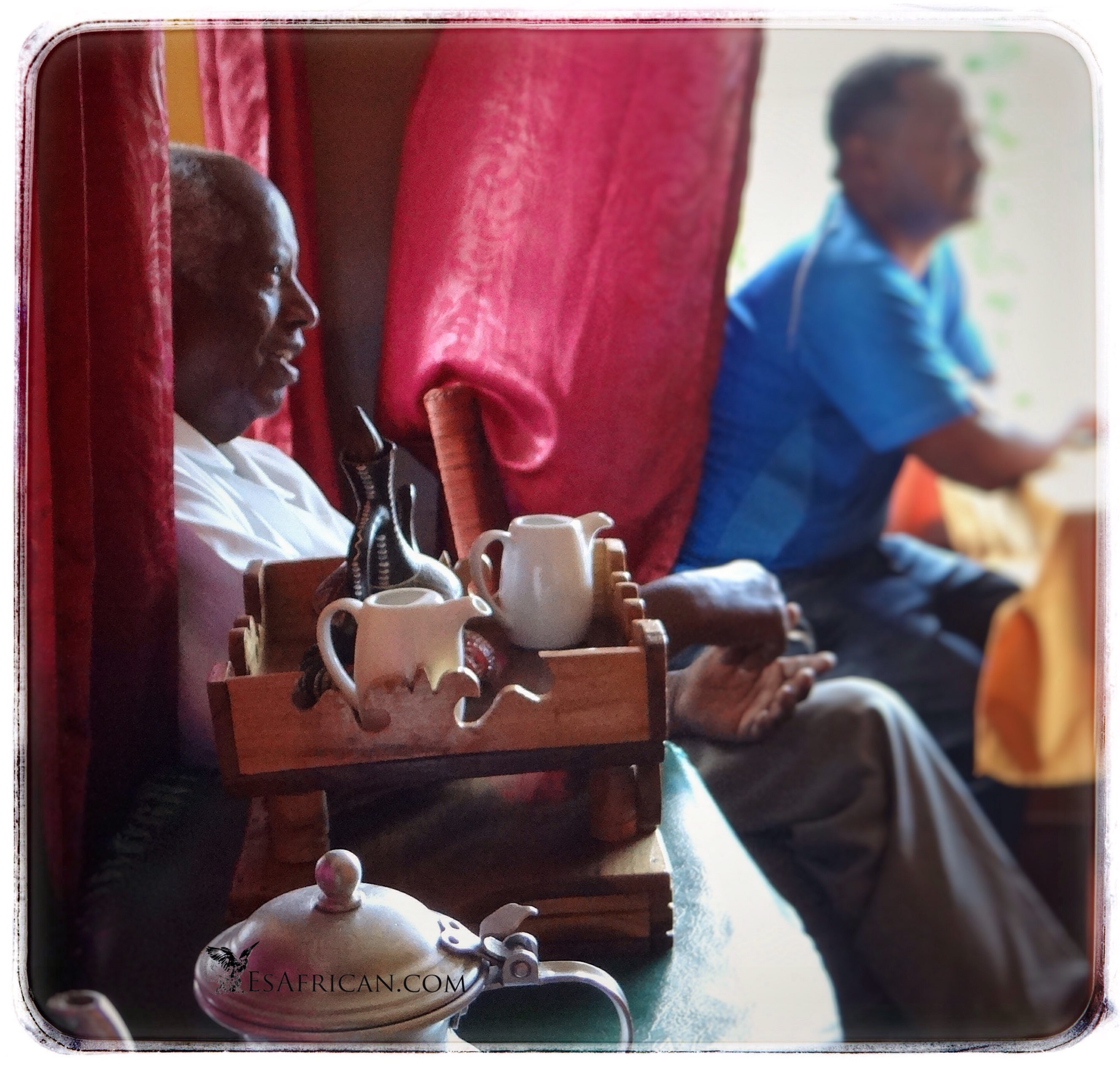 Get to know nice people while learning about an intriguing countrySomeone else in Malawi gave a talk to the Mountain Club of Malawi about a stopover in Ethiopia that involved cultural experiences and mountains. That certainly wetted the appetite for more. The prices seemed more than reasonable especially if one follows some helpful pointers that I took note of.
Get to know nice people while learning about an intriguing countrySomeone else in Malawi gave a talk to the Mountain Club of Malawi about a stopover in Ethiopia that involved cultural experiences and mountains. That certainly wetted the appetite for more. The prices seemed more than reasonable especially if one follows some helpful pointers that I took note of.
How would a bit of advance planning work? Well, why not visit an Ethiopian family in Malawi. Talk and find out, make contacts and be inspired. The Abebe family are a warm open and friendly people. Get to know them over a coffee and more.
If you are interested in trying an authentic Ethiopian experience then please click on this link here to make your plans.
